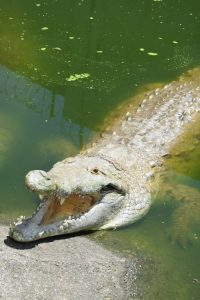Local scientists and students from the University of Florida’s Institute of Food and Agricultural Sciences are leading research efforts to save an endangered species of crocodiles in Colombia.
On June 25, faculty, students and scientists supporting global conservation efforts for crocodiles like these invite the public to the 22nd Summer CrocFest. The event will take place from noon to 8:30 p.m. at Everglades Alligator Farm, 40351 SW 192nd Ave. in Homestead, FL. Tickets cost $10 for children and $30 for adults. Registration tickets are available online.
CrocFest, in its 12th year, is held each summer and winter. Activities are family-friendly and geared toward raising awareness and funds for crocodilian research and related conservation programs and projects. It also recognizes the conservation work of researchers.
Funding crocodilian research efforts promotes the survival of these species and others around the world. This summer’s CrocFest 2022 will support the reintroduction of 20 adult Orinoco crocodiles in the Tomo River in Colombia in November of this year. It will also help to cover planned nesting surveys as part of the continued research.

“The Orinoco crocodile (Crocodylus intermedius) is one of the most threatened crocodilian species in the Americas due mainly to overhunting and habitat degradation,” said Sergio Balaguera-Reina, a member of the research team and a quantitative ecologist with the Croc Docs at UF/IFAS. “This project pioneers the use of genetic information previously collected from both ex and in-situ populations to guide where and how to release individuals, thus securing the genetic integrity of the species.”
Balaguera-Reina is joined by Ana Maria Saldarriaga of Fordham University, Mario Vargas-Ramirez of Universidad Nacional de Colombia, German Forero of the Wildlife Conservation Society, Carlos Saavedra of the Wildlife Conservation Society, and Rafael Antelo, a consultant on the project.
The UF/IFAS Croc Docs, based at UF/IFAS Fort Lauderdale Research and Education Center, are active participants in CrocFest. Each year, they award the prestigious Rafael Crespo Conservation Award. This year’s honoree is Ana Maria Saldarriaga, who is being recognized for her work with Orinoco crocodiles.
Crocodiles are an important part of the environment. They regulate populations, keep areas of open waters free of invading vegetation, create habits for other animals and are indicators of the health and sustainability of various sensitive ecosystems.
Orinoco crocodiles are restricted to the Orinoco River basin in Colombia and Venezuela. Efforts to recover the species across its range have led to a ban hunting and the promotion of reintroduction programs, said Balaguera-Reina.
In Colombia, a national conservation and management program was developed in 1998 to delineate steps needed to recover the species without affecting the few populations still found in the wild. Since then, conservation efforts have reintroduced individuals in protected areas and have raised the crocodiles outside their native range to support a restocking program. However, there is still a long way to go before fully recovering the species.
“Our current project focused on using the Orinoco crocodile population held at the Roberto Franco Biological Station, National University of Colombia, as the base to restock populations in areas where the species used to live as well as boost current populations that are fragmented or affected by reduced numbers,” he said.
In November, the team plans to release and track 20 adult Orinoco crocodiles in an area with low to no human presence and where the species has not been recorded in more than 30 years.
###
Lourdes Mederos, rodriguezl@ufl.edu
ABOUT UF/IFAS
The mission of the University of Florida Institute of Food and Agricultural Sciences (UF/IFAS) is to develop knowledge relevant to agricultural, human and natural resources and to make that knowledge available to sustain and enhance the quality of human life. With more than a dozen research facilities, 67 county Extension offices, and award-winning students and faculty in the UF College of Agricultural and Life Sciences, UF/IFAS brings science-based solutions to the state’s agricultural and natural resources industries, and all Florida residents.
 0
0
